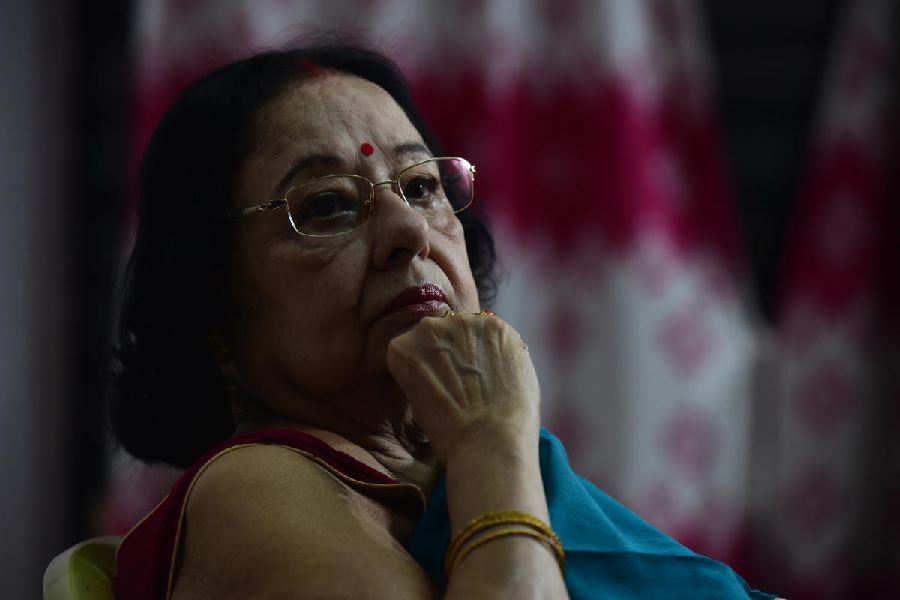The nameplate on the apartment door reads “Madhabi”. The person who answers the doorbell turns out to be the frail bearer of that weighty name. Later in the course of this interview, she says, “My name is Madhuri. Producer Bijoy Chatterjee renamed me before the release of the film Baishey Sravan.” A publicity stunt, so he could say in the title credits ‘introducing so and so’. “I was not happy about it but I couldn’t refuse,” says the heroine of Bengali cinema, now 82.
Madhabi Mukhopadhyay is talking. The heroine of Mrinal Sen, Ritwik Ghatak, Satyajit Ray, Tapan Sinha. Madhabi, who played Charu in Charulata, was Malati of Baishey Sravan, Sita of Subarnarekha, Arati of Mahanagar, Sulekha of Chadmabeshi. Madhabi of talking eyes, sensitive paan-face and (seemingly) effortless acting.
The fair-sized south Calcutta apartment, where she lives by herself, is crowded with cupboards. Peeping out of them are medals, shields and statuettes. The walls are achatter with paintings and photographs of the actress. Among them is a collector’s item, a movie poster of Nashtanirh, which is the abortive title of the film famous the world over as Charulata. Tagore’s novella on which Ray’s film was based had been called Nashtanirh. Charulata was Ray’s christening.
Ray’s Charulata had an itinerant companion, her opera glasses. Charu was restless, if you remember; now stitching, now writing, now running from window to window... Madhabi the actress has fractured her leg on a film set — yes, she continues to work — and does not get up from her yellow plastic throne in the course of the two-hour interview and keeps apologising for it.
Madhabi says she doesn’t like being interviewed. “I can’t lie,” she says and branches off into a tale about one of her grandfathers who told her a fairy tale and convinced her for life to be a slave of the truth. It has not made her life any easier, she admits.
She is more comfortable talking about her childhood. Her mother was a stage actress. And she was only six when one of the child actors in her mother’s play fell ill and she had to step into her shoes. It was Sisir Bhaduri who cast her in the play Sita. “Do you want to hear those lines,” she asks. Her delivery style is typical of playsof that era. She starts to talk about the stage, how she went on to work with Chhabi Biswas, Ahindra Chow-dhury, Prabha Devi, Sarajubala Devi. She was trained in music by the actor-composer-singerK.C. Dey, uncle of Manna Dey. And now, archivist Devajit Bandyopadhyay is working on her autobiographical podcast.
She was introduced into movies by writer and director Premendra Mitra, but it was Tapan Sinha who was the first to cast her in a lead role. The film was called Tonsil. Says Madhabi, “He selected me because I was very skinny.” The poster of the 1956 film mentions her as Madhuri Mukhopadhyay.
The bigger break came three years later with Mrinal Sen’s Baishey Sravan. At the screen test at Sen’s tiny apartment, she was asked if she could sweep and swab and do other domestic chores. She was also asked if she knew how to make cow dung cakes. The truth fairy almost did her in. She says, “We were poor. My parents separated when my elder sister and I were very young; naturally we siblings learnt to help around the house rather early on in life. But in the rented house in north Calcutta, I didn’t have to make dung cakes. I was quiet and quite sure that I would be rejected.”
Sen’s wife Gita stepped in, assured the director that it was no big deal. What clinched the offer for her was possibly the verdict from Sen’s domestic help. “He told Mrinalda that my face evoked maya,” says Madhabi. It is difficult to capture in English the essence of the Bengali word maya. Suffice to say it is something like sympathy, with a lot of fondness taking the edge off the pity quotient. Sen said to him, “If you feel maya, I am sure the audience will also feel the same,” and went ahead and cast her.
According to Madhabi, it was Sen who helped her transition from a stage artiste to a film actress.She says, “Movies are actually directors’ ventures, we actors try to do what they want us to do. The stage is different.”
Sen trained her to get into the skin of the character, explained why it was necessary to work on her diction, taught her to face the camera and encouraged her to improvise whenever the need arose.
There was no looking back after her spectacular performance in Baishey Sravan. Next, the maverick Ghatak casther in Subarnarekha. Says Madhabi, “He was a complete outlier who had no written script. Each and every shot was arranged in his mind. He had a drinking problem, true, but that did not interfere with his creativity.”
Subarnarekha was shot around the same time as Ray’s Mahanagar, but it was released later. The actress remembers how it irked Ghatak a little. “At the premier of Mahanagar he told Ray — ‘Wait and watch; she has performed much better in my movie.’”
After Mahanagar, Ray made Charulata and then Kapurush; Madhabi played the lead in all of them. Wasn’t she supposed to act in his Ghare Bairey? The role that was eventually essayed by Swatilekha? Madhabi nods in affirmation. “He had requested me on multiple occasions, but I had to turn him down,” she says and pauses.
What she goes on to say will possibly make sense only to a much winnowed down generation of film folk. “Politics and conspiracies.”
It is what she says thereafter could help one negotiate the reams of unsaid. “Uttam Kumar and Chhabi Biswas were top actors. They were also good human beings. Anil Chatterjee was in the same league but lost out because he couldn’t handle political rivalry,” she says. Madhabi talks about singer-actress- producer Kanan Devi who she says inspired her to be independent.
And then suddenly, “Do you know why Charu used binoculars,” the veteran asks. Unlocking the answer to her own mystery question she herself replies, “Binoculars bring near what is in reality far. Charu needs binoculars to see Bhupati, her husband. She does not need them to see her deor Amal. Relationships and their dynamics...”











